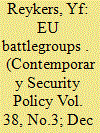| Srl | Item |
| 1 |
ID:
156091


|
|
|
|
|
| Summary/Abstract |
This article reviews the gloomy saga of the EU Battlegroups, focusing on four questions: Where do they come from? What do they look like? What have they been hindered by? And where do they go from here? It builds upon earlier findings in the literature and adds novel insights based on original data. In doing so, the article pays particular attention to the standby nations’ constant calculation of political and financial costs. It argues that recognizing these cost–benefit calculations allows for identifying the most crucial areas to be tackled to make the EU Battlegroups functional. In addition, the article stresses that these considerations play out in a setting wherein the Battlegroups are just one among many policy instruments available for rapid response.
|
|
|
|
|
|
|
|
|
|
|
|
|
|
|
|
| 2 |
ID:
144768


|
|
|
|
|
| Summary/Abstract |
In 2014, the European Union (EU) launched the sixth review of the Athena mechanism that finances the common costs of military operations launched in the framework of its Common Security and Defence Policy (CSDP). In the run up to the review, there were expectations that it would improve financial burden sharing in CSDP operations by expanding common funding for them. However, these hopes were disappointed; the review became a diplomatic tug of war between France, the strongest supporter of expanded common funding, and the UK, its strongest opponent. In the end, France agreed to the UK's terms to ensure that the existing level of common funding would not decrease. This article analyses the Athena review from a neoclassical realist perspective. It argues that the review's outcome was due to the imbalance of influence among EU member states and the diverging preferences of their Foreign Policy Executives (FPEs). These factors caused the Athena review to remain in the hands of a small group of member states that had diverging utility expectations and ideological preferences. Thus, the article shows that a surprisingly intense burden-sharing dispute has emerged within CSDP.
|
|
|
|
|
|
|
|
|
|
|
|
|
|
|
|